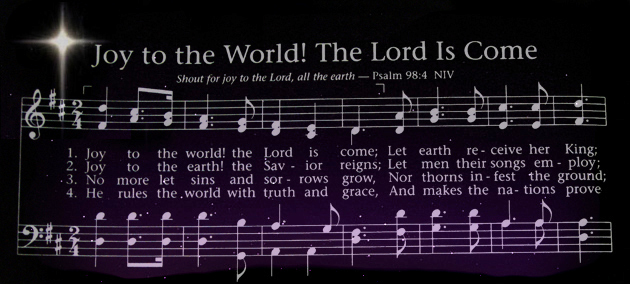Sermons and Articles | Ken Puls
Joy to the World and Sing a New Song
From a Sermon by Ken Puls on Psalm 98
In Psalm 98:1 we are commanded to "Sing to the LORD a new song." In every place and in every age as the gospel goes forth, we are to add our voice to the tapestry of God's praise. In the early 1700s in England that task fell in part to a young man named Isaac Watts. God used Watts to significantly impact the church music of his day.
Isaac Watts began writing poetry as a boy. When he was about 5 years old, his mom was cleaning the house and found several poems he had written. They were so good she did not believe that he had actually written them. He went to his room and made up a poem based on acrostic of his own name to prove to her that he was indeed the author.
I am a vile polluted lump of earth,
So I've continued ever since my birth;
Although Jehovah grace does daily give me,
As sure this monster Satan will deceive me,
Come, therefore, Lord, from Satan's claws relieve me.Wash me in Thy blood, O Christ,
And grace divine impart,
Then search and try the corners of my heart,
That I in all things may be fit to do
Service to Thee, and sing Thy praises too.[from Isaac Watts Remembered: 1674Ð1748 by David Fountain
(Worthing: Walter, 1974)]
As a teenager Watts became concerned with the poor state of music in the church. Most of the singing in his day was of unaccompanied metrical psalms. The intent and content were good—they wanted to honor God and they were singing the Word of God, but unfortunately, the quality of the music and practice of singing in many places was very poor.
Isaac Watts heard the music of his day, and as one who loved and wrote poetry, he realized that many of the attempts to fit words to meter were poor and unsingable. He also took exception with those who claimed that the church should only sing the words of the 150 psalms in the book of Psalms. Watts was not opposed to singing psalms, but he believed that if we are going to sing them, we ought to sing them well and we ought to sing them in light of the gospel with new words that clearly show how they speak of Christ.
On one particular evening, while coming home from church, young Isaac was disparaging the music he had heard that day. His dad became frustrated with him, turned around and challenged him—if you don't approve of what we sing, why don't you write something better?
Watts did exactly that, and in the course of life to follow composed over 600 hymns and became known in years to come as the father of English hymnody. Watts published his first collection of hymns in 1707, called Hymns and Spiritual Songs. It was received so well that by 1709 he followed with a second edition.
His success was not without criticism, however. He was accused by many of abandoning psalm singing. He answered his critics with a collection in 1719 called: The Psalms of David Imitated in the Language of the New Testament.
It included a setting of Psalm 98. Watts wanted people to see and hear and understand Christ in this psalm. He had two main concerns in the hymns he composed:
- He wanted to write beautiful words that people could sing and remember
- He wanted to focus the words on Christ. You can't sing the psalms as a Christian and not say anything about Christ.
And so he read verses 4-6:
Shout joyfully to the LORD, all the earth;
Break forth in song, rejoice, and sing praises.
Sing to the LORD with the harp,
With the harp and the sound of a psalm,
With trumpets and the sound of a horn;
Shout joyfully before the LORD, the King.
(Psalm 98:4–6)
And then he composed:
Joy to the world! The Lord is come:
Let earth receive her King;
Let every heart prepare Him room,
And heaven and nature sing…
He read verses 7 and 8:
Let the sea roar, and all its fullness,
The world and those who dwell in it;
Let the rivers clap their hands;
Let the hills be joyful together before the LORD,
(Psalm 98:7–8)
He responded with:
Joy to the earth! The Savior reigns:
Let men their songs employ;
While fields and floods, rock hills, and plains,
Repeat the sounding joy…
He read verses 1Ð3:
Oh, sing to the LORD a new song! For He has done marvelous things;
His right hand and His holy arm have gained Him the victory.
The LORD has made known His salvation;
His righteousness He has revealed in the sight of the nations.
He has remembered His mercy and His faithfulness to the house of Israel;
All the ends of the earth have seen the salvation of our God.
(Psalm 98:1–3)
And he wrote:
No more let sins and sorrows grow,
Nor thorns infest the ground;
He comes to make His blessings flow
Far as the curse is found…
He read verse 9:
For He is coming to judge the earth.
With righteousness He shall judge the world,
And the peoples with equity.
(Psalm 98:9)
And he concluded his setting with:
He rules the world with truth and grace,
And makes the nations prove
The glories of His righteousness,
And wonders of His love…
Read More of the Sermon "Sing a New Song"on Psalm 98
Go List of Sermons and Articles
Return to Hymns from History
©2007 Ken Puls
Sermon Notes
Series: Thoughts on Worship
From a Sermon delivered at Grace Baptist Church, Cape Coral, FL
December 23, 2007
Scripture quotations are from the New King James Version (NKJV) ©1982 by Thomas Nelson, Inc.
